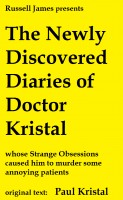EG: Tell
us about your current novel.
RJ: It’s
a breakaway from the noir crime stories for which I’m known – and it has by far
the longest title! The Newly Discovered Diaries of Doctor Kristal (subtitled: whose Strange Obsessions caused him to
Murder some annoying patients) is a wry
psychological crime story set in 1963 through 64, told in diary form by a 35
year old virgin for whom sex – or rather, his 35 years without – sets him off
on a line of murders.
This is my first crime novel for
five years or so – not that I’ve been idle: in the interim I’ve produced two
historical novels, a present-day and (would you believe?) four biographical
picture books including, as you may remember, Great British Fictional Detectives.
EG: Can you say a
little more about what you're working on now?
RJ: Well,
among the curious doctor’s patients is
attractive young Jane Quinney, grateful for some help he gave before but now
saddled with an unwanted pregnancy.
(This is 1963, remember.) Then
there’s beautiful Eleanor Rouse, unhappily married to a sexually voracious and
overweening actor more than a decade older than her. But it’s another woman, facing an altogether
more unpleasant dilemma, who causes the doctor the greatest trouble of all. Plus there are two other doctors in the town,
and they have plans for Doctor Kristal.
So in a tumultuous year which sees the Profumo affair and the
assassination of President Kennedy Doctor Kristal’s provincial life is all set
to spiral out of control.
EG: What is the
greatest pleasure of a writing career?
RJ: Other
writers! I shouldn’t say it but I like
meeting and talking with other writers more than I do with readers. At least they don’t ask me, “Where do you get
your ideas?” In truth though, the
greatest pleasure for every writer must lie in finishing a book – that short
period when you’re happy with it and think it the greatest thing you’ve ever
written and the one that is finally going to make your name. The moment before reality sets in.
EG: What
is the greatest DISpleasure?
RJ: Apart
from that moment when reality sets in?
The hardest time is when your latest is not immediately snapped up by a
publisher overwhelmed by how great it is and desperate to tie you in before
other publishers make a bigger offer. Or
maybe it’s when, for whatever reason, the latest doesn’t get the usual number
of reviews. I don’t know why it is but
some books just seem to slip through the net and – you know? – being ignored is
worse than being criticised. You ask,
“Why did I bother?” and there’s no answer to that.
EG: If
you have one piece of advice for the publishing world, what is it?
RJ: As
if they’d listen to me! But I guess they should realize that the
challenge today isn’t whether ebooks will replace print ones but how the two
should live together. The market has
been expanded! Increasingly it’ll be
ebooks for an immediate read (cheaper, faster – like paperbacks back in the Thirties)
and well-made print books to be cherished and kept.
EG: Are
there two or three forgotten mystery writers you’d like to see in print again?
RJ: The
truth is they’re all coming back –
thanks partly to ebooks and partly to some of the smaller go-ahead new
publishers – but it’s probably forgotten books
rather than writers that I like to read again.
A E W Mason’s At The Villa Rose,
for example, was a great book but the follow-up Hanaud books kind of fell
away. That often happens with series;
the story has been told in the first book and after that it’s just more of the
same. How many times do you want to meet
the blind detective (Carrados) or The Old Man in the Corner, or Lady Molly of
Scotland Yard? They’re amusing once but . . .
EG: Tell
us about selling your first novel. Most writers never forget that moment.
RJ: No
writer could forget it. If they say they did, they’re lying. Anyway, my true first novel wasn’t accepted, and while it went the
rounds gathering encouraging refusals (is that an oxymoron?) I wrote another,
sent it to Gollancz, and had it accepted within three weeks! They said it would come out in their famous
yellow and black livery, and I was taken out to lunch by my young and
attractive editor (still a great editor, by the way) and we ate outdoors in a
little place off Haymarket in London’s West End, and the sun shone, and she
said I should join the Crime Writers Association, and I said, “Would they have
me?” and she said, “Of course they will. You’re a crime writer now,” and that,
Ed, was as good as it gets for any writer anywhere, any time. You never forget a day like that.


No comments:
Post a Comment